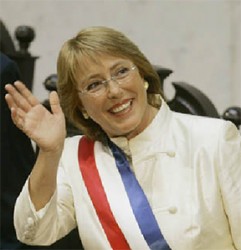SANTIAGO, (Reuters) – Michelle Bachelet was elected as Chile’s president again yesterday in a landslide victory that should hand the center-leftist the mandate she sought to push ahead with wide-reaching reforms.

With nearly 70 percent of votes counted, Bachelet had about 63 percent support, the highest proportion of votes any presidential candidate has won since Chile returned to holding democratic elections in 1989.
Evelyn Matthei, the conservative candidate of the ruling Alianza coalition, managed only 37 percent of the vote, the right’s worst performance in two decades.
Bachelet, who led Chile between 2006 and 2010 as its first female leader, will look to capitalize on her resounding win to make changes aimed at redressing persistent inequality in the world’s top copper exporter.
A physician by training, Bachelet is a moderate socialist and has promised 50 reforms in her first 100 days, once she takes office in March.
Her flagship policy is a hike
in corporate taxes to 25 percent
from 20 percent, to pay for social reforms that include a gradual move to free higher education.
RELIEF, BUT NOT A SURPRISE
Bachelet’s campaign to return to La Moneda presidential palace suffered a setback last month, when the presence of eight other candidates fractured the first round vote and left her just short of the majority needed to seal the election outright.
So yesterday’s large margin of victory will come as a relief, if not a surprise.
Approval ratings for Bachelet, loved by many Chileans for her warm and personable style, were sky-high at the end of her first term. Constitutionally barred from seeking immediate re-election in 2009, she has been the runaway favorite to win this year’s vote since before she even launched her candidacy.
Her opponent Matthei, a brusque former labor minister, had been a last-minute choice for Alianza in July, and struggled to gain traction against Bachelet.
Hailing from the more conservative branch of the governing coalition, Matthei was tainted in the eyes of many Chileans by her association with the repressive 1973-1990 dictatorship of General Augusto Pinochet. Her father was a general in the ruling junta and she supported Pinochet in a 1988 plebiscite.
Dissatisfaction with outgoing President Sebastian Pinera’s administration also weighed on Matthei’s campaign. Despite solid economic growth and plaudits for its fiscal responsibility, the government has been seen as out of touch and slow to respond to demands for change.




